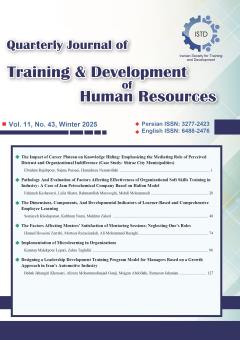Designing a Leadership Development Training Program Model for Managers Based on a Growth Approach in Iran’s Automotive Industry
Subject Areas : روش های نوین آموزش وتوسعه منابع انسانی
BABAK JAHANGIRI KHOONSARI
1
![]() ,
alireza mohammadinezhad ganji
2
,
alireza mohammadinezhad ganji
2
![]() ,
Mojgan Abdollahi
3
,
Mojgan Abdollahi
3
![]() ,
رمضان جهانیان
4
,
رمضان جهانیان
4
1 -
2 - Associate Professor, Department of Educational Sciences, Karaj Branch, Islamic Azad University, Karaj, Iran E_Mail: aganji33@Yahoo.Com
3 - Assistant Professor, Department of Educational Sciences, Karaj Branch, Islamic Azad University, Karaj, Iran
4 - Professor, Department of Educational Sciences, Karaj Branch, Islamic Azad University, Karaj, Iran
Keywords: Semi-structured interview, coding, managerial growth, leadership development, automotive industry,
Abstract :
In the dynamic and turbulent environment of the automotive industry, leadership development based on a growth approach is considered a key driver of organizational success. This study aims to design a leadership development training program model for managers grounded in the growth approach. In the realm of organizations, management is one of the most influential factors affecting societies. Effective leadership and management are regarded as prerequisites for improving quality within organizations and are seen as the cornerstone of organizational success and employee achievement. In today's volatile and rapidly changing environments, the survival of organizations necessitates continuous organizational transformation, both behaviorally and structurally. This study seeks to present an overview of transformational leadership—recognized as a key leadership dimension that can foster creativity and strategic innovation within organizations—by emphasizing the role of leadership in enhancing innovation. To achieve this objective, experts in the automotive industry holding master's and doctoral degrees at the senior management level were selected as the target population. The research was conducted through the analysis of 14 semi-structured interviews with senior managers in the automotive sector. The data were analyzed in three coding stages—open, axial, and selective—using MAXQDA software. The final model consists of six core components: causal conditions, contextual conditions, strategies, intervening conditions, consequences, and the central phenomenon. Key strategies identified include mentoring, conducting situation-based workshops, and leadership style analysis. This model represents the first localized framework that integrates precise training needs assessments with organizational requirements in the automotive industry.
